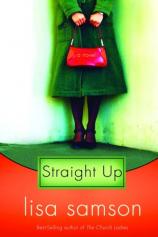Straight Up
Review
Straight Up
Lisa Samson's delightful prose and interesting, gritty characters propel STRAIGHT UP, a novel about choices and consequences, the could-have-beens and should-have-beens, grief over wasted opportunities and our need for community.
Talented 32-year-old jazz musician Georgia Bishop has chosen the bottle over her music, rejecting her handsome husband Sean for a life of sitting alone at a bar and drinking away her potential. Her cousin, Fairly Godfrey, has her own troubles: at 26 she has lost her parents and her husband is hovering at the brink of death, and the solace of vintage clothing and antique furniture isn't enough to fill the gaping holes. The seemingly stable Uncle Geoffrey ("Uncle G") tries to glue the cousins back together when the trajectory of their lives intersects in Samson's hometown of Lexington, Kentucky. But will his love, the strength of his faith and his gentle acceptance be enough? The consequences of choices don't always have happy endings, and admirably, Samson portrays this without flinching as Fairly inadvertently brings things to a tragic climax.
In Samson's fictional world, food and coffee are the great consolers, and readers will salivate over the delicious culinary details throughout. Della-Faye bakes scrumptious peach cobbler and to-die-for fried chicken at the restaurant down the street, and Solo, a Congolese refugee, is quick to whip up an espresso when his friend Fairly is feeling low.
Samson is the veteran author of 18 books (including WOMEN'S INTUITION and CLUB SANDWICH) and is not afraid to take risks in her writing. Characters come in a rainbow of ethnicities, and Samson treats interracial couples in a matter-of-fact way rather than making race a point of tension --- something welcome and still fairly unusual in faith fiction.
The best moments revolve around Samson's portrayal of the community of faith --- a sometimes loose conglomeration of the walking wounded, the displaced, the neglected and abused, and the artistic misfits. There's quite a bit of the supernatural thrown in, especially toward the end, but nothing preachy or cliché. Book discussion groups will be delighted at the opportunities for debate on topics such as alcoholism, widowhood, race, caring for the wounded and the abused, medical ethics, marriage and spiritual calling, using or wasting our talents and gifts. What comes powerfully across is the potential each of us has to help change the life of another for the better. What also comes across is our ability to choose to reject this help.
One reason I love reading Samson's novels is her fresh and invigorating prose, which is in full evidence here. Lines such as "Twenty-two years later and the day she died still feels like stepping on a nail" provoke an almost physical reaction from the reader. Tropical fish "tinsel up a tank" and artists flow through a place "like warmed butterscotch over ice cream." On fried chicken: "That first bite is as good as a blanket out of the dryer after sledding or a gulp of cold Coke after a day of yard work." Hair is "rivered with silver." In describing herself, Fairly notes, "People see me as a birdbath. I am a well." I could read for pages for nothing else but the promise of more descriptions like these.
The constant switching back and forth between points of view and time periods are sometimes confusing and choppy, but hang with them: the characters are strong enough to move the book to its redemptive yet unsentimental conclusion, and the elegant prose will keep the pages turning.
Reviewed by Cindy Crosby on September 19, 2006




